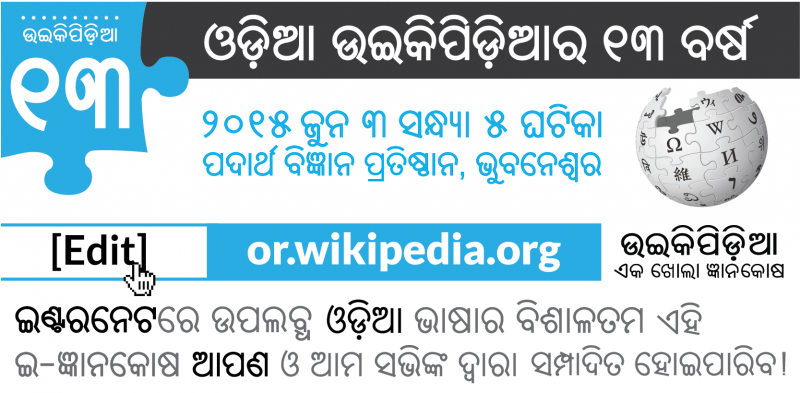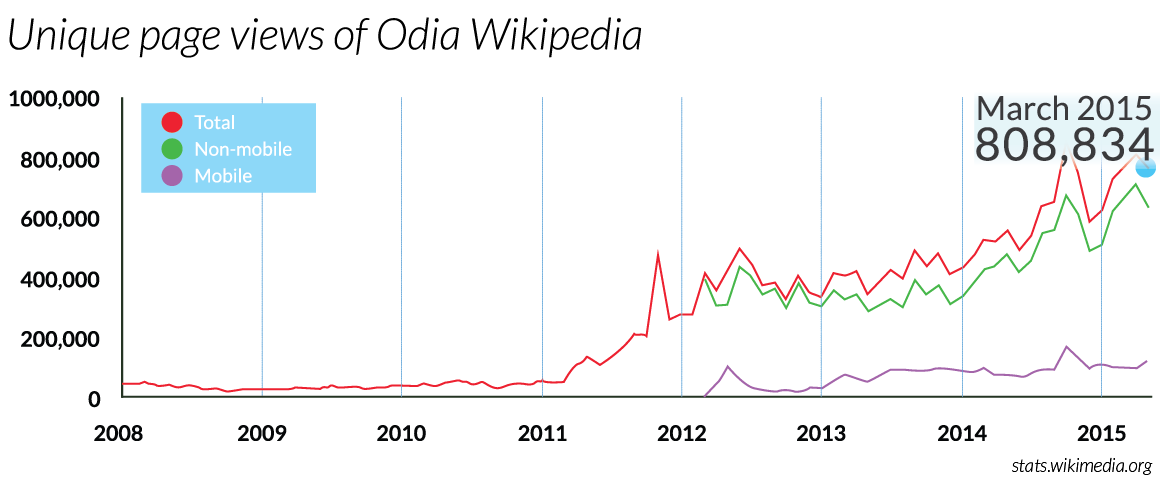
“Odia Wikipedia 13″ event banner that has a quote “This (Odia Wikipedia) largest online Odia encyclopedia can be edited by you and us”. By Subhashish Panigrahi, under CC-by-SA 4.0.
Odia Wikipedia, one of the first of several Indian language Wikipedia projects, is ready to celebrate 13 glorious years of free knowledge contribution on June 3.
Beginning in 2002 — a year after the world's largest online encyclopedia, the English Wikipedia, was launched — Odia Wikipedia has grown to be the largest content repository in the Odia language available in Unicode* on the Internet.
With about 17 active editors (also known as “uikiali”) spread across various parts of India and abroad, and over 8,800 articles, the project has become more than just an encyclopedia. The voluntary editor community has put its efforts into acquiring valuable Creative Commons (CC) licensed content by lobbying copyright holders/authors to relicense copyrighted content under CC licenses.
It has also engaged with over 2,000 people by organizing various outreach programs including the globally accredited pedagogic program the Wikipedia Education Program (WEP).
For its 13th anniversary the community is planning to release a character-encoding converter that promises to unlock massive amounts of content from government portals as well as journals, newspapers and magazines that have their content in non-Unicode character encoding that prevents user searching and reuse of digital-based content.

Unique page views of Odia Wikipedia (2008-2015).
Odia language is spoken by more than 40 million people in the Indian state of Odisha (the 9th largest Indian state by territory), its neighboring states and the Odia diaspora living outside India.
With over 5,000 years of literary heritage, it has been recognized as one of the oldest South Asian languages and has been given the status of a “classical language” by the Indian government.
However, the language has not gathered as much traction in terms of online presence as it might have.
Almost all the online newspapers in Odia are available either in non-Unicode and proprietary encoding systems, or as images. This makes them completely invisible as far as a search engine is concerned.
The same goes for the state government's official portals that either lack Odia-language content or have content in legacy encoding systems. To address these issues, a bunch of character encoding converters that convert text typed using various non-Unicode encoding systems to Unicode are incorporated on Odia Wikipedia.
With this new tool, the community aims at a mass conversion of content from all available sources — from newspapers and magazines to government journals and portals — into Unicode, so this content can be used in order to enrich Odia Wikipedia and generally improve the language's reach online.
Odia Wikipedia was not content-rich until the beginning of 2011, when editor activity began to pick up.
Since then it has expanded its content massively, with topics ranging from the essentials of medical science to the cuisine of Odisha.
The growth in readership of the project is a great example of how content is driving the internet. A project that was virtually unknown a few years back with monthly page views in the low thousands recorded 8,08,834 page views in March 2015 alone.
The Wikimedia community is gathering in Odisha's capital Bhubaneswar this June 3 to celebrate Odia Wikipedia becoming a teenager.
Event details: https://or.wikipedia.org/s/sml








1 comment